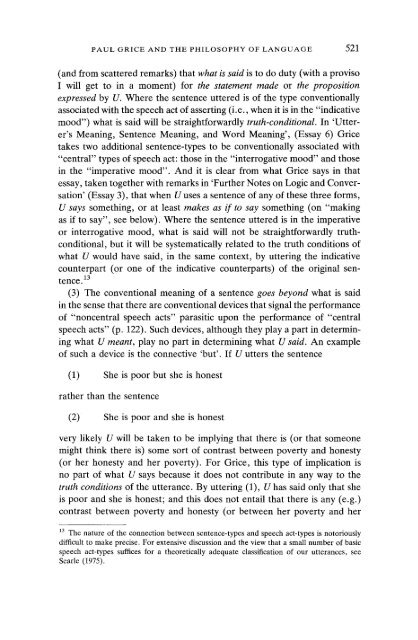Paul Grice and the philosophy of language
Paul Grice and the philosophy of language
Paul Grice and the philosophy of language
You also want an ePaper? Increase the reach of your titles
YUMPU automatically turns print PDFs into web optimized ePapers that Google loves.
PAUL GRICE AND THE PHILOSOPHY OF LANGUAGE 521<br />
(<strong>and</strong> from scattered remarks) that what is said is to do duty (with a proviso<br />
I will get to in a moment) for <strong>the</strong> statement made or <strong>the</strong> proposition<br />
expressed by U. Where <strong>the</strong> sentence uttered is <strong>of</strong> <strong>the</strong> type conventionally<br />
associated with <strong>the</strong> speech act <strong>of</strong> asserting (i.e., when it is in <strong>the</strong> "indicative<br />
mood") what is said will be straightforwardly truth-conditional. In 'Utterer's<br />
Meaning, Sentence Meaning, <strong>and</strong> Word Meaning', (Essay 6) <strong>Grice</strong><br />
takes two additional sentence-types to be conventionally associated with<br />
"central" types <strong>of</strong> speech act: those in <strong>the</strong> "interrogative mood" <strong>and</strong> those<br />
in <strong>the</strong> "imperative mood". And it is clear from what <strong>Grice</strong> says in that<br />
essay, taken toge<strong>the</strong>r with remarks in 'Fur<strong>the</strong>r Notes on Logic <strong>and</strong> Conversation'<br />
(Essay 3), that when U uses a sentence <strong>of</strong> any <strong>of</strong> <strong>the</strong>se three forms,<br />
U says something, or at least makes as if to say something (on "making<br />
as if to say", see below). Where <strong>the</strong> sentence uttered is in <strong>the</strong> imperative<br />
or interrogative mood, what is said will not be straightforwardly truthconditional,<br />
but it will be systematically related to <strong>the</strong> truth conditions <strong>of</strong><br />
what U would have said, in <strong>the</strong> same context, by uttering <strong>the</strong> indicative<br />
counterpart (or one <strong>of</strong> <strong>the</strong> indicative counterparts) <strong>of</strong> <strong>the</strong> original sentence.<br />
13<br />
(3) The conventional meaning <strong>of</strong> a sentence goes beyond what is said<br />
in <strong>the</strong> sense that <strong>the</strong>re are conventional devices that signal <strong>the</strong> performance<br />
<strong>of</strong> "noncentral speech acts" parasitic upon <strong>the</strong> performance <strong>of</strong> "central<br />
speech acts" (p. 122). Such devices, although <strong>the</strong>y play a part in determining<br />
what U meant, play no part in determining what U said. An example<br />
<strong>of</strong> such a device is <strong>the</strong> connective 'but'. If U utters <strong>the</strong> sentence<br />
(1) She is poor but she is honest<br />
ra<strong>the</strong>r than <strong>the</strong> sentence<br />
(2) She is poor <strong>and</strong> she is honest<br />
very likely U will be taken to be implying that <strong>the</strong>re is (or that someone<br />
might think <strong>the</strong>re is) some sort <strong>of</strong> contrast between poverty <strong>and</strong> honesty<br />
(or her honesty <strong>and</strong> her poverty). For <strong>Grice</strong>, this type <strong>of</strong> implication is<br />
no part <strong>of</strong> what U says because it does not contribute in any way to <strong>the</strong><br />
truth conditions <strong>of</strong> <strong>the</strong> utterance. By uttering (1), U has said only that she<br />
is poor <strong>and</strong> she is honest; <strong>and</strong> this does not entail that <strong>the</strong>re is any (e.g.)<br />
contrast between poverty <strong>and</strong> honesty (or between her poverty <strong>and</strong> her<br />
13 The nature <strong>of</strong> <strong>the</strong> connection between sentence-types <strong>and</strong> speech act-types is notoriously<br />
difficult to make precise. For extensive discussion <strong>and</strong> <strong>the</strong> view that a small number <strong>of</strong> basic<br />
speech act-types suffices for a <strong>the</strong>oretically adequate classification <strong>of</strong> our utterances, see<br />
Searle (1975).














